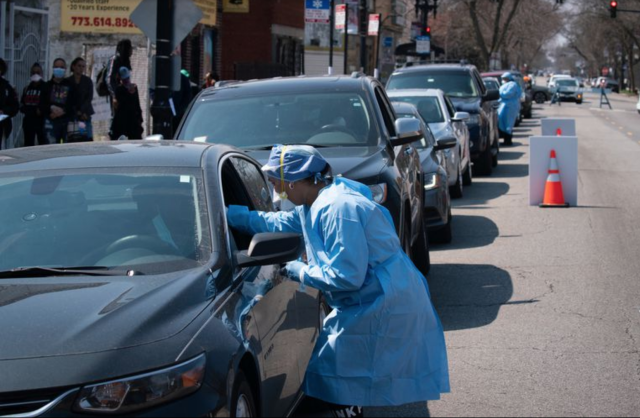 People line up in their cars at the COVID-19 testing area at Roseland Community Hospital on April 3, 2020, in Chicago. (Chicago Tribune)
People line up in their cars at the COVID-19 testing area at Roseland Community Hospital on April 3, 2020, in Chicago. (Chicago Tribune)
Chicago Tribune
A new, different type of coronavirus test is coming that will help significantly in the fight to quell the COVID-19 pandemic, doctors and scientists say.
The first so-called serology test, which detects antibodies to the virus rather than the virus itself, was given emergency approval Thursday by the U.S. Food and Drug Administration. And several more are nearly ready, said Dr. Elizabeth McNally, director of the Northwestern University Feinberg School of Medicine Center for Genetic Medicine.
“You’ll see many of these roll out in the next couple of weeks, and it’s great, and it will really help a lot,” said McNally, noting doctors and scientists will be able to use it to determine just how widespread the disease is, who can safely return to work and possibly how to develop new treatments for those who are ill.
The serology test involves taking a blood sample and determining if it contains the antibodies that fight the virus. A positive result indicates the person had the virus in the past and is currently immune.
That kind of test will be far easier to roll out and use than the complex nasal swab tests now being used to detect the active virus that causes COVID-19, she added, saying it’s possible that the antibody tests could be conducted in the confines of one’s own home, much like a pregnancy test.
“They will come in a variety of shapes and sizes,” McNally said. “The simplest would be one that you do at home, that you would poke your finger and squeeze out a little blood and put it on a little strip, and it’ll be the plus-minus whether you’ve developed antibodies or not.”
There are several benefits to having the test, including:
Determining how much of the population is infected.
“One of the questions we are going to be asking … is, ‘How widespread was this virus?’ ” McNally said. “I think we have a lot of indication that it’s much more widespread than we know, because most of the younger people who get this get it relatively mildly, recover and do OK. And we’re not tracking any of those people right now.”
Interestingly, the more people who have had it, the safer everyone is, under the concept of “herd immunity.”
“The people who are already covered can actually provide protection to the people around them, just because it’s hard for the virus to spread,” McNally said. “The virus can’t spread anymore, so people are less likely to get it.”
Figuring out who can go back to work, particularly sidelined doctors and nurses, police officers and firefighters.
If a person is positive for antibodies, which likely show up two to six weeks after infection, they’re not going to get sick or spread the virus, because their bodies are killing it off. “Once the antibodies come up in your system, that means your body fought it off, and you don’t have active virus,” McNally said.
—
Related:
Ethiopia Declares State of Emergency, Recruits Health Workers to Fight Virus
Ethiopia Virus Cases Hit 52 (LATEST UPDATE)
Ethiopia Races to Bolster Ventilator Stockpile for Coronavirus Fight
Social Distancing Works. The Earlier the Better, California & Washington Data Show.
Over 10 million Americans Apply for Unemployment Due to Coronavirus (LATEST UPDATE)
U.N. Chief Calls Pandemic Biggest Global Challenge Since World War II
2020 Ethiopia Election Canceled Due to COVID-19
Getting Through COVID 19: ECMAA Shares Timely Resources With Ethiopian Community
U.S. Approves Malaria Drug to Treat Coronavirus Patients
The Curious Case of Ethiopian Traditional Medicine Covid19 Treatment & Need for Caution
2020 Olympics Rescheduled for July 2021
Haile Gebrselassie Donates to Ethiopia Covid-19 Fund
Maryland Issues COVID-19 Fact Sheet in Amharic for Ethiopian Community
Art in the Time of Coronavirus: Guide to Virtual Exhibitions from Ethiopia to U.S.
We Need Seismic Change, Right Now: by Marcus Samuelsson
City Sleeps: A Look At The Empty NYC Streets Amid The Virus – In Pictures
Ethiopia enforces 14-day quarantine for all travelers
Diaspora-based Tech Professionals Launch Ethiopia COVID-19 Response Task Force
Amid COVID-19 Pandemic Hopeful & Inspiring Stories Shared by Obama
Pleas to Diaspora to Assist Coronavirus First Responders in Ethiopia
Coronavirus Sparks an Epidemic of People Helping People in Seattle
Join the conversation on Twitter and Facebook.

























